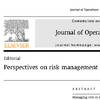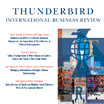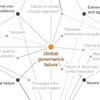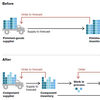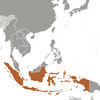 Indonesia. 17000 islands spread over a distance of 6000 kilometres. Mega-cities and remote desolate villages side by side. Congested freeways and dirt roads just a short distance apart. Home to frequent earthquakes and volcano eruptions, mudslides and flooding in the rainy season. A logistical challenge for any supply chain, if not a logistical nightmare, and thus prone to supply chain disruptions. One would think that supply chain risk management would find fertile soil here, but does it? According to what Rofyanto Kurniawan and Suhaiza Zailani wrote in Supply Chain Vulnerability and Mitigation Strategy of the Manufacturing Firms in Indonesia: Manager’s Perspectives, Indonesia still has a long way to go.
Indonesia. 17000 islands spread over a distance of 6000 kilometres. Mega-cities and remote desolate villages side by side. Congested freeways and dirt roads just a short distance apart. Home to frequent earthquakes and volcano eruptions, mudslides and flooding in the rainy season. A logistical challenge for any supply chain, if not a logistical nightmare, and thus prone to supply chain disruptions. One would think that supply chain risk management would find fertile soil here, but does it? According to what Rofyanto Kurniawan and Suhaiza Zailani wrote in Supply Chain Vulnerability and Mitigation Strategy of the Manufacturing Firms in Indonesia: Manager’s Perspectives, Indonesia still has a long way to go.
Two in one
Actually, there are two articles dealing with more or less the same topic. The second piece titled Urgency in Managing the Risk in Supply Chain Amongst Indonesian Manufacturing Companies, written by Iwan Vanany and Suhaiza Zailani (again), has a slightly different focus, but both deal with the same topic: Supply Chain Risk Management in Indonesia, or more accurately, the lack of such management, as supply chain managers tend to wait and see rather than engage in proactive risk mitigation.
Critique
Both articles highlight that the concept of supply chain vulnerability and thus supply chain risk management are rather new notions in the Indonesian business world, and this despite the obvious fact that supply chain disruptions are occurring quite frequently throughout Indonesian supply chains. The general attitude of logistics and supply chain professionals, however, seems to be that this is simply the way things are.
These papers paint a vivid and colourful picture of the kinds of supply chain risks and disruptions that occur in an Indonesian setting, ranging from the obvious natural disaster, like the Yogyakarta earthquake in 2006, through rampant corruption and nepotism, sudden power blackouts and questionable work ethics, along with examples of remote logistics. As I learned from a video I found on a Norwegian blog on disasters and climate, Indonesia is also highly vulnerable to climate change, as shown in this video on adapting to climate change in Indonesia:
Much of the incidents cited in the article is anecdotal, without any sort of reference, e.g. newspaper articles that could have supported the claims. Other cases and situations are cursory treated and lack the necessary contextual explanations and assume prior knowledge, others again are only understandable to those with at least some inside knowledge of Indonesian society; and it is only because I have spent some time in the country that I was able to follow their deductions from point to point.
In addition, the papers suffer from a severe non-native English speaker syndrome, which make them additionally hard to read, with some passages, I’m sorry to say, being near unintelligible. I found this rather surprising, considering the excellent literature review on supply chain risk management that some of these authors have done previously.
Add to that the seemingly haphazardly insertion of references to wherever they might (but not do) fit, which adds even more confusion to an already struggling reader. Some references, although wholly or partially mentioned in the text, are blatantly missing from the bibliography, or even wrongly dated. Due diligence?
These flaws aside, the papers do provide a seldom seen inside look at Indonesian attitudes towards risk management, as very few papers to this date have delivered such detailed descriptions of supply chains in Asia. To the Indophile supply chain risk researcher, me included, these two papers bring valuable insights and the future works of these authors will most certainly be worth following.
Reference
Kurniawan, R., & Zailani, S. (2010). Supply Chain Vulnerability and Mitigation Strategy of the Manufacturing Firms in Indonesia: Manager’s Perspectives. International Business Management, 4 (3), 116-123 DOI: 10.3923/ibm.2010.116.123
Vanany, I. and Zailani, S. (2010). Urgency in Managing the Risk in Supply Chain Amongst Indonesian Manufacturing Companies. International Business Management, 4 (4), 199-208 DOI: 10.3923/ibm.2010.199.208
Author links
- linkedin.com: Iwan Vanany
- linkedin.com: Suhaiza Zailani
- Unknown: Rofyanto Kurniawan
medwelljournals.com
Published by Pakistan-based Medwell Journals, the International Business Management journal is a relatively new addition to the world of academic journals, and has been around since 2007. The journal proudly claims to be open access, which is certainly commendable; what is perhaps not so commendable is their editorial oversight, as I have already noted in my critique above. While the papers have to follow a strict outline, thus suggesting a high quality standard, their content does not hold up to the same standards. It is rare that I comment on the language or form of the articles I review, and I have noted editorial glitches on occasion, and only when I thought it really necessary. This journal certainly has some way to go before it can keep up with the big players in the world of academic journals.

